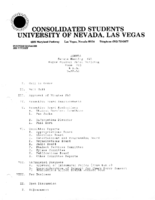Search the Special Collections and Archives Portal
Search Results
Rodel Fuentes oral history interview
Identifier
Abstract
Oral history interview with Rodel Fuentes conducted by Tracy Fuentes on December 4, 2021 for Reflections: The Las Vegas Asian American and Pacific Islander Oral History Project.
Rodel Fuentes tells stories of his upbringing in Manila, Philippines, where he was raised in a shared family home amongst his parents, siblings, aunts, and uncles. He talks about his parents' immigration to the United States and how he later joined them in Los Angeles, California where he met and married his wife. Rodel Fuentes shares the couple's decision to move to Las Vegas, Nevada, his work at Dunn Edwards paint company, and how he became a licensed general contractor and real estate agent where he now owns his own company. Rodel Fuentes discusses his thoughts on Las Vegas' diversity, affordability, restaurants, and Asian community. He also talks about experiencing anti-Asian hate, worsened by misconceptions and discrimination that came from the COVID-19 pandemic.
Archival Collection
Chris Tonemah oral history interview
Identifier
Abstract
Oral history interview with Chris Tonemah conducted by David Schwartz on June 08, 2015 for the Table Games Management Oral History Project. In this interview, Tonemah discusses her upbringing in Flagstaff, Arizona and attending dealing school in Las Vegas, Nevada. She remembers the switch to corporation ownership of Las Vegas casino properties, auditioning to deal at the MGM Grand, and the increase of women dealers during the 1980s. Tonemeh describes the MGM Grand fire and becoming a dealer at Caesars Palace Hotel and Casino. Lastly, Tonemeh discusses the opening of The Venetian, transitioning to the roll of pit boss, and changes she has experienced in card dealing.
Archival Collection
Carol Frey oral history interview
Identifier
Abstract
Oral history interview with Carol Frey conducted by Claytee D. White on March 30, 2018 for the Remembering 1 October Oral History Project. In this interview, Carol Frey discusses her work as a volunteer for the Trauma Intervention Program (TIP) of Southern Nevada. She specifically talks about the October 1, 2017 mass shooting in Las Vegas, Nevada and her volunteer efforts at one of the hospitals, where she provided support for survivors of the shooting, answering any questions they had, calling family members, arranging transport of loved ones to Las Vegas, and any other assistance that was needed, either emotional or practical. Throughout the interview, Frey discusses the moments that have stuck with her, including the gestures of gratitude the TIP volunteers had received from United Health Care employees and Sandy Hook High School students.
Archival Collection
Raquel Ward oral history interview
Identifier
Abstract
Oral history interview with Raquel Ward conducted by Claytee D. White on March 25, 2010 for the UNLV University Libraries Oral History Collection. In this interview, Ward discusses her upbringing and family background in Tierra Blanca, Veracruz, Mexico. She remembers completing nursing school in Mexico, arriving to Las Vegas, Nevada in 1958, and attending the University of Nevada, Las Vegas. Ward talks about moving to Boulder City, Nevada, raising her children in Las Vegas, and the increase of organized crime during the 1960s. Lastly, Ward discusses the fast growth of the Hispanic community in Las Vegas during the 1970s and Hispanic representation in political positions.
Archival Collection
Edythe Katz oral history interview
Identifier
Abstract
Oral history interview with Edythe Katz conducted by Walter Duttweiler on March 01, 1977 for the Ralph Roske Oral History Project on Early Las Vegas. Katz discusses the Jewish community, Ralph Denton, atomic testing, and integration in movie theatres.
Archival Collection

Meeting minutes for Consolidated Student Senate, University of Nevada, Las Vegas, September 22, 1981
Date
Archival Collection
Description
Text
Randy Char oral history interview
Identifier
Abstract
Oral history interview with Randy Char conducted by Cecelia Winchell and Stefani Evans on December 15, 2021 for Reflections: The Las Vegas Asian American and Pacific Islander Oral History Project.
Randy discusses his family history, his childhood growing up in California, and his undergraduate education. He shares his employment history that ranged from selling life insurance to trading stocks and finally selling luxury real estate. Randy talks about pursuing an MBA program at Pepperdine University during the 2008 financial crisis and how his capstone project idea of luxury real estate lounges helped him to open his own brokerage in Las Vegas in 2014 before becoming a real estate broker for Sotheby's. Randy also shares his thoughts on diversity within Asian cultures and different Asian American Pacific Islander (AAPI) organizations that helped him to "reclaim his Asian identity" including the Asian Real Estate Association of America (AREAA) and the Leaders Forum.
Archival Collection
Clarence Ray oral history interview
Identifier
Abstract
Oral history interview with Clarence Ray conducted by Eleanor L. Walker in 1991 for the African American in Las Vegas: a Collaborative Oral History Project. In this interview, Ray provides details of his ancestry and upbringing, his education, and race relations in the western United States before 1930. He then moves on to his first visit to Las Vegas, Nevada in 1922, and his movements before settling permanently in the 1940s. He explains that the main source of employment for the relatively small Black population during the 1920s and early 1930s was the railroad, but a number were also in business. Mr. Ray provides thumbnail sketches of many of the early residents, and is particularly informative about "Mammy" Pinkston, Mary Nettles, the Stevens family, and the Ensley family. Systemic racial discrimination against Blacks developed in southern Nevada during the 1930s, and Mr. Ray provides some useful details on this along with his discussion of his career in gaming and his social and political activities.
Archival Collection

Hamed Ahmady oral history interview: transcript
Date
Archival Collection
Description
Oral history interview with Hamed Ahmady conducted by Stefani Evans on March 22, 2023 for the Reflections: the Las Vegas Asian American and Pacific Islander Oral History Project. Interviewed by Stefani Evans. Culinary Union Local 226 organizer Hamed Ahmady recalls his childhood as the oldest of six children in Mazar-e Sharif in northern Afghanistan. As an child, he remembers hearing about the September 11, 2001 attack in New York while living in a Taliban-controlled city on a television connected to a concealed antenna that received signals from Uzbekistan. He recalls how, one month after he graduated high school, he became an translator for the U.S. Army, which he did for more than four years. He talks about securing his Special Immigrant Visa (SIV); landing in Los Angeles, California in 2013 and moving his family to the United States; and supporting his siblings and parents in Afghanistan. He also discusses relocating his family from California to Las Vegas, Nevada in 2018, finding a mosque community, and working with Culinary Union Local 226.
Text
Mauricia Baca oral history interview
Identifier
Abstract
Oral history interview with Mauricia Baca conducted by Claytee D. White on March 7, 2019 for the Remembering 1 October Oral History Project. Mauricia Baca discusses her early life, her education, and her experiences living in New York City, New York before she moved to Las Vegas, Nevada. She also relates her experiences on and after the 1 October mass shooting. Baca relates information on her agency, Get Outdoors Nevada. Baca shares how her agency worked with the City of Las Vegas in the construction and operation of the Healing Garden. Finally, she discusses the book she helped author regarding 1 October.
Archival Collection
